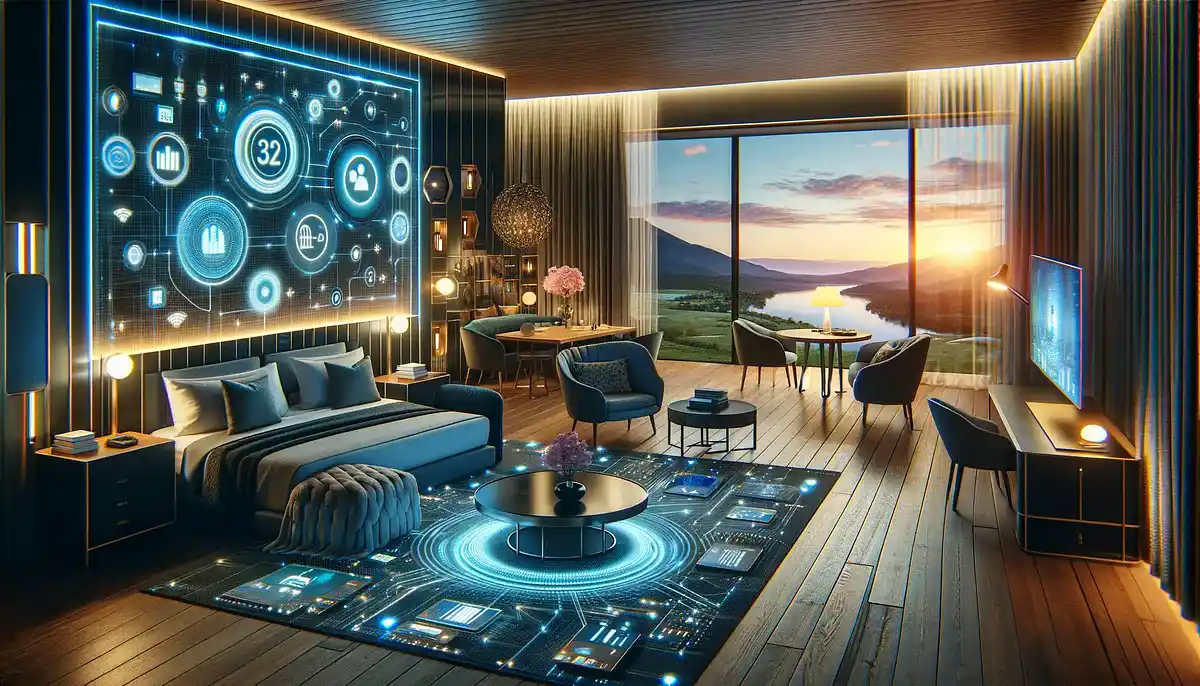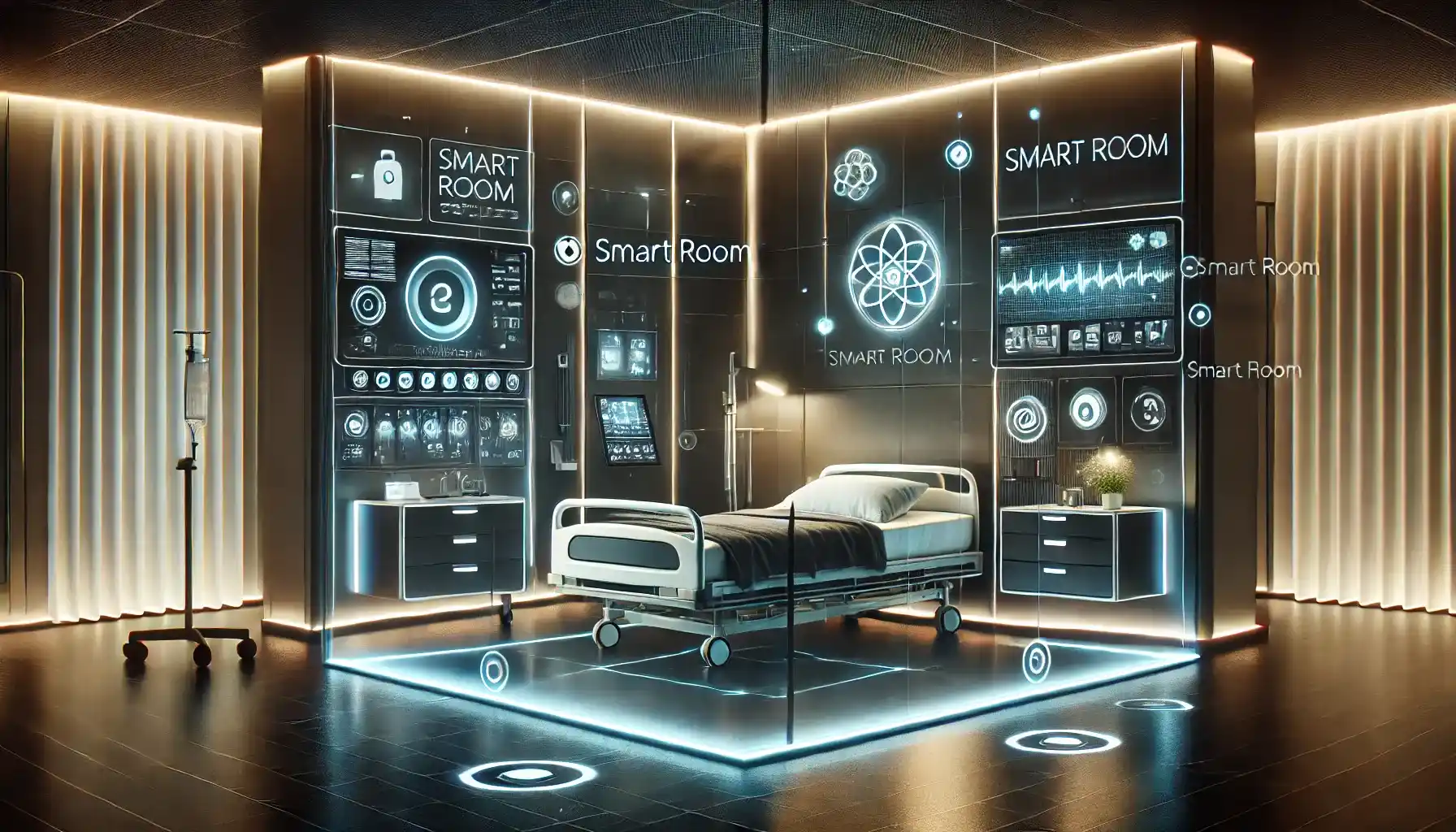Table of Contents
Smart Room Tech is reshaping the hospitality industry, offering an innovative approach to guest experience and operational efficiency. By integrating IoT devices and automation into hotel rooms, this technology allows guests to enjoy personalized, seamless stays while helping hotels streamline their daily tasks.
From voice-activated controls to energy management, Smart Room Tech is revolutionizing hotel operations, enhancing customer satisfaction and boosting profitability.
In this article, we’ll explore seven innovative ways Smart Room Technology transforms the hospitality industry, making it smarter, more efficient, and guest-centric.
How Smart Room Tech is Revolutionizing the Hospitality Industry?
1. Enhancing Guest Experience
- Smart Room Tech is transforming how hotels deliver personalized experiences. Guests can control various room features, like lighting, temperature, and entertainment, using connected devices and IoT technology through mobile apps or voice assistants like Alexa.
- Smart hotel systems gather guest preferences to offer tailored recommendations, enhancing comfort and convenience. These real-time, customized experiences not only boost guest satisfaction but also foster loyalty, making every stay feel unique and memorable.
2. Streamlining Hotel Operations
- Smart Room Tech is also streamlining hotel operations by automating routine tasks. From optimizing housekeeping schedules to controlling energy use, IoT devices and automation increase efficiency and reduce costs.
- Hotels can manage room reservations, monitor occupancy, and automate climate control, allowing staff to focus on high-value guest services. This smart use of technology not only improves operational efficiency but also boosts revenue, leading to a more seamless and profitable operation.
3. Enhancing Security and Safety with Smart Room Tech
- Smart room tech, including smart locks, surveillance systems, and IoT-enabled rooms, significantly boosts security for both guests and staff. Smartphone-managed access control ensures that only authorized personnel can enter restricted areas, providing an extra layer of protection.
- Hotels are increasingly adopting these technologies for real-time monitoring, advanced threat detection, and improved staff workflows, all contributing to a safer and more secure environment for everyone.

7 New Technologies Revolutionizing the Hospitality Industry
Discover how cutting-edge technologies are transforming the hospitality sector, elevating guest experiences, and streamlining hotel operations.
1. Voice-Activated Room Controls
- Smart speakers, like Amazon Alexa and Google Assistant, are enhancing hotel stays by enabling voice control over room features. Guests can adjust lighting, set the room temperature, or play entertainment with simple commands, creating a more personalized, hands-free experience.
- With 62% of hotels now integrating voice-activated devices, this tech is becoming a hospitality staple, boosting guest satisfaction while simplifying room management.
2. Mobile Check-In and Digital Keys
- Mobile check-ins and digital keys are revolutionizing the check-in process by allowing guests to skip the front desk entirely. Using smartphones, guests can check in, unlock their rooms, and even access hotel services without physical interaction. This not only reduces congestion but enhances security, as digital keys can be deactivated remotely.
- With 53.6% of travelers preferring contactless solutions, this technology offers a seamless, modern experience.
3. Smart Thermostats and Lighting
- Smart thermostats and lighting systems are key to providing comfort while improving energy efficiency. These IoT-powered devices learn guest preferences and automatically adjust room temperature and lighting based on occupancy or time of day.
- Hotels benefit from lower energy costs, while guests enjoy customized comfort, contributing to the hotel’s sustainability efforts. This tech helps hotels align with both operational efficiency and green initiatives.
4. In-Room Tablets and Interactive Displays
- In-room tablets and interactive displays give guests full control over their room settings, room service, and even local recommendations. These devices allow instant access to hotel services like housekeeping or restaurant menus.
- This creates a highly engaging guest experience while streamlining hotel operations, making it easier for staff to manage guest requests in real-time.

5. AI-Powered Guest Communication Assistants
- AI-powered guest assistants, such as MARA, provide highly personalized interactions by analyzing guest preferences. From recommending local attractions to customizing in-room settings, these AI systems deliver a tailored experience.
- Hotels also use AI to engage guests post-stay, collecting feedback and improving guest loyalty. AI enhances marketing precision, boosts retention, and increases overall satisfaction through personalized service.
6. Robotic Service Delivery
- Robots are being introduced to handle tasks like room service delivery, concierge services, and even cleaning. This futuristic approach allows hotel staff to focus on complex guest interactions while the robots handle repetitive tasks efficiently.
- Robots add a tech-forward appeal, boosting operational efficiency and enhancing the guest experience with a unique, high-tech twist.
7. Energy Management Systems
- Energy management systems utilize IoT and real-time data to optimize energy consumption, adjusting based on room occupancy and guest needs. This helps hotels reduce operational costs and align with eco-friendly trends, appealing to 78% of travelers who prioritize sustainability.
- By embracing smart energy solutions, hotels can both save on energy and attract environmentally conscious guests.
Example of a Smart Hotel
Marriott’s IoT Guestroom Lab and Hilton’s Connected Room are two standout examples of how smart technology is reshaping the hotel experience.
Marriott’s IoT Guestroom Lab
Marriott’s IoT Guestroom Lab showcases the future of smart hotels by transforming traditional rooms into highly personalized, tech-enabled spaces. In this innovative environment, guests can control room features such as lighting, temperature, and entertainment through voice commands, all powered by advanced IoT devices.
Smart locks provide seamless and secure room access, removing the need for key cards, while interactive wall maps and displays help guests navigate the hotel and access real-time service information. These smart technologies not only elevate guest satisfaction but also streamline hotel operations and reduce energy costs.
Hilton’s Connected Room
Hilton’s Connected Room takes smart hotel technology to the next level by offering guests full control of their room environment through their smartphones or in-room tablets. Guests can adjust lighting, temperature, and entertainment options with ease.
The Connected Room also integrates with Hilton’s mobile app, allowing guests to check in, choose their rooms, and unlock doors—all via their phones. This high level of automation enhances guest convenience and provides Hilton with valuable insights into guest preferences, allowing for more personalized services and improved operational efficiency.
Conclusion
Smart room technology is rapidly transforming healthcare by automating critical processes, enhancing patient comfort, and improving operational efficiency. From voice-activated controls to IoT-powered monitoring systems, these innovations not only streamline medical care but also elevate the patient experience.
As healthcare providers continue to adopt smart solutions, the future promises more personalized, efficient, and secure environments for both patients and staff. Embracing smart room technology is no longer just a trend—it’s becoming essential for modernizing healthcare and meeting the growing demands of an ever-evolving industry.





